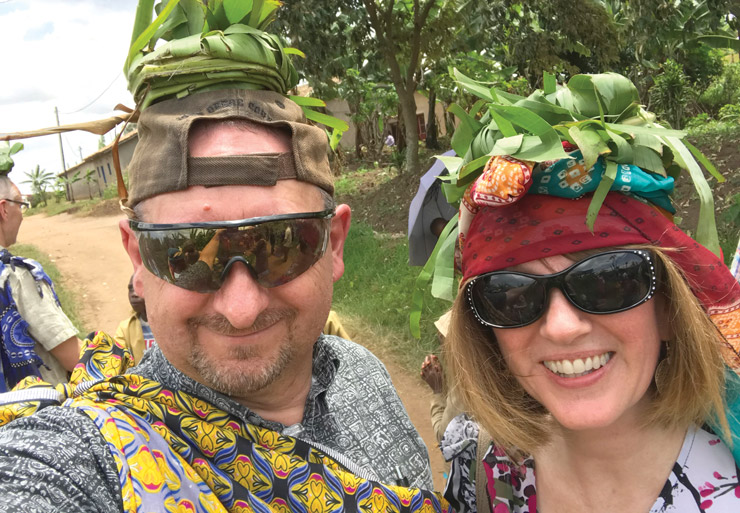
Ben and Tanny Kellert recently returned from a trip to Rwanda with more than just photos of a great vacation.
The two were on a vision trip through the Wellspring Foundation for Education, a group that has been working in Rwanda since 2004, with a nation seeking to rebuild their nation in the aftermath of genocide that killed a million people in a 90-day period.
The founders of Wellspring had a dream to help the country rebuild through education, the development of schools, and by training a whole generation of educators who learned how to pass it forward, a new model of education.
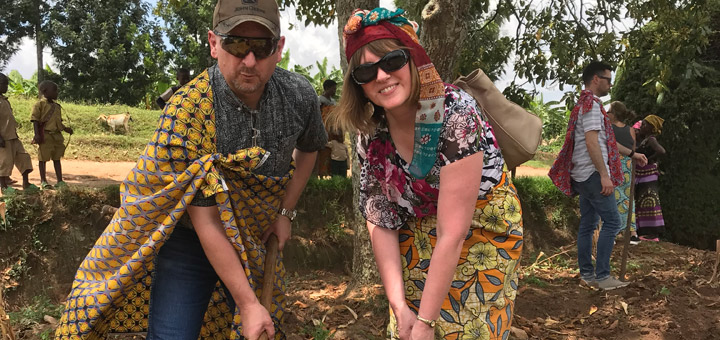
Kellert, who is the mayor of Killam and the pastor of the Killam Pentecostal Church, says he found out about Wellspring through his sister, who accompanied them on the trip with her husband. Tanny is the Director of the Flagstaff Food Bank.
Kellerts say that Rwanda is now a politically stable, peaceful nation. During their trip, they got to visit Azizi, a cooperative community called Abaharaniriterambere, which means “people fighting for development” who make and sell hand crafted items in a global community.
Ben says the visit was part of a Wellspring program called, “A day in the life of…” It started at the gates of the community, as the residents there greeting their visitors with dancing and singing in welcome.
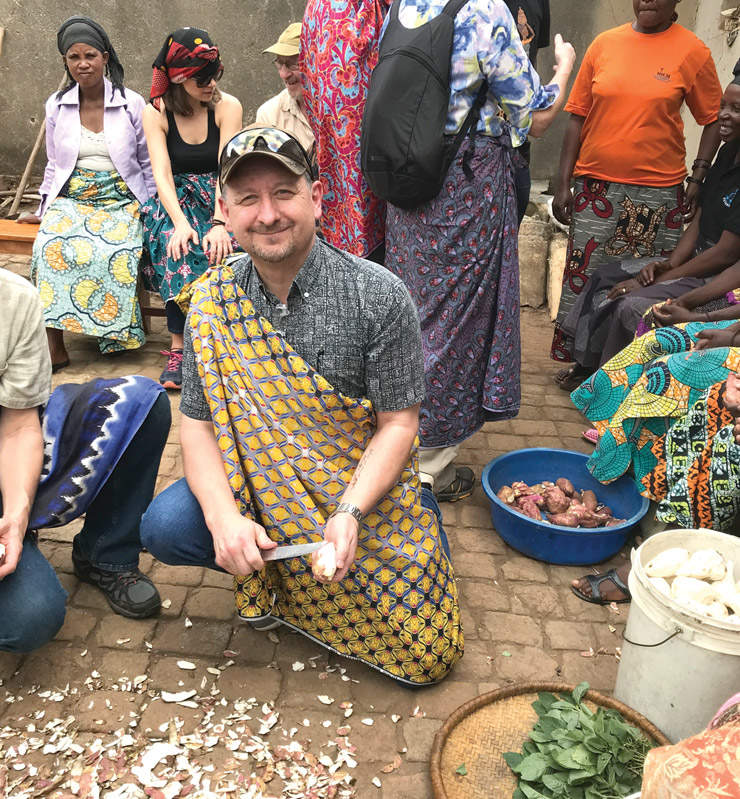
Ben says, “They starting grabbing guests to dance with them, including Tanny.” She says later on Ben was pulled into a dance competition that he and his partner won.
Men were dressed in sari-like swaths of cloth, while women visitors were given skirts and headpieces.
Visitors do all things that residents of the cooperative do, from peeling potatoes to walking for fresh water one km away, then returning with a five-litre container balanced on your head.

Kellert says that carrying things on heads is an art form in Rwanda. He also says that a couple of five litre containers of water are heavy.
The couple spent time in the fields preparing for seed with their hoes. They took up small scythes and cut grass, turned them into sheaves, and carried them on their heads to feed the cooperative’s resident cow.
Visitors had their own interpreter, and were thus able to ask and answer questions.
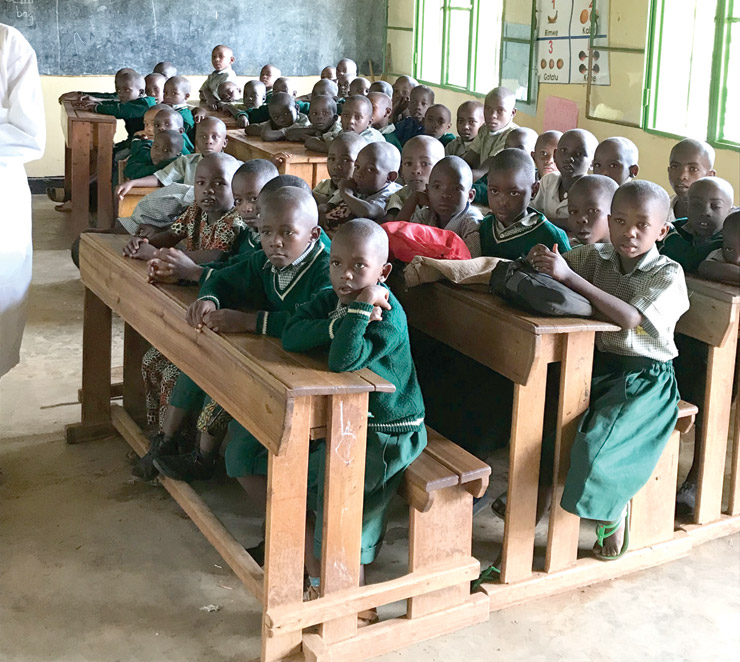
Another day, the pair visited the Rwandan Genocide Memorial Museum. “There were 250,000 people buried right in that spot,” said Kellert.
Kellerts say everywhere you go in the region they visited were signs, “A United Rwanda.” The genocide started when the population divided Rwandans into tribes, and because of the division, one tribe was obliterated.
“That’s part of what Wellspring is fighting for,” says Ben. “From the kids up. They start with education as their main focus, and they practice what they call “servant leadership” which is more of a program where teachers honour their students, and pass forward information through encouragement and praise.”

“The new government knows education is key to never repeating their horrific past. The forgiveness and reconciliation you see there is really amazing.”
Kellerts had the opportunity to tour Wellspring schools, where classrooms of 60 to 70 students would come from early morning to noon, then go home so that a second group could attend school in the afternoon, with the same teacher attending both classes. Kellerts say that in former schools in Rwanda, students were beaten for giving incorrect answers. “Wellspring started new schools based on kindness, positive reinforcement, and encouragement.
“They have worked alongside the new Rwandan government, and have passed along their desire to create, fund, and encourage education.”

Wellspring schools started at 350 students, and have grown to over 750.
“The church started the school initially, but went to the government there, and said, “We have a vision, for education, for healthcare, but we need property.”
“The government offered them an 18-acre garbage dump, and they took it. Now in that area, which has been completely transformed, there is a church that can hold a thousand people, but still has to hold three services every Sunday. There’s a 750-kid complex, a sports field, a basketball court, a playground, a birthing facility, and a park.”
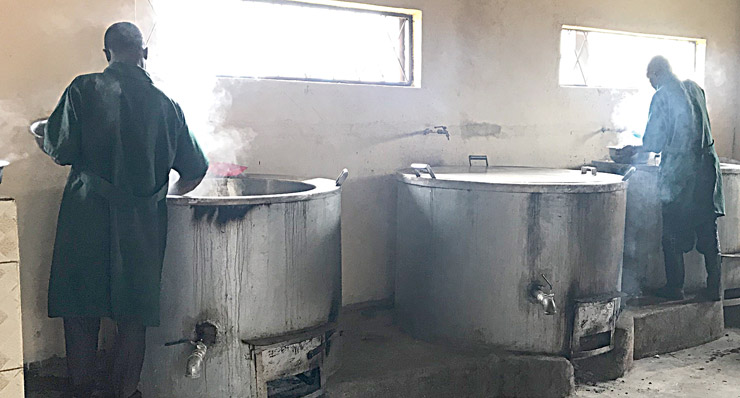
They say that one of the things they recognized is that Wellspring is an organization with amazing dreams. “And they will do amazing things. We saw such amazing things, and such engagement from students from using new teaching methods that are student-centric; not lecturing students, but education as an involved process.”
Wellspring fundraises in North America for their schools, but all staff are nationals from Rwanda, there are very few outsiders within the organization.
“One of the key concepts is the involvement with parents at the school,” says Ben. “Where before there were these teacher-centred schools, Wellspring is teaching parents to be a part of the success for their children.
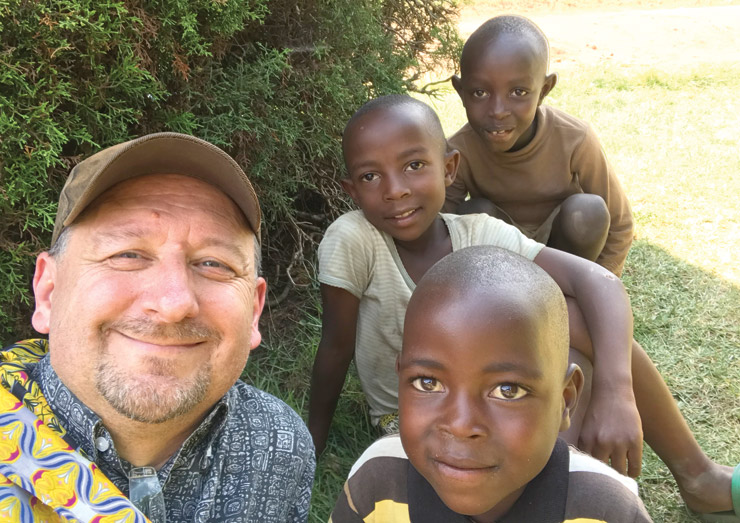
“For example, parents tend a garden that helps feed the students at one school. For another project, parents built a wall around the school grounds for safety.”
Tanny says the parent project that inspired her was a wash station outside the school bathrooms. “I hope that it will inspire more improvements to sanitary conditions.”
Both were impressed by parents who built a kitchen onto their children’s school building for three massive vats that contain enough rice to feed the entire school population.
“Wellspring has an understanding that parents help is key for success, especially with asset-based contributions like they are doing,” says Tanny. “There is such respect between parents and teachers, and the teachers are so passionate. They are poorly paid, something like $3 per day, but well respected and loved.”
Rwanda is a country about the size of Vancouver Island with a population of 12.5 million. Fully half of that population is under 18 years old, say the Kellerts. “The cycle of poverty needs to end, and education is the key. Wellspring recognizes that.”
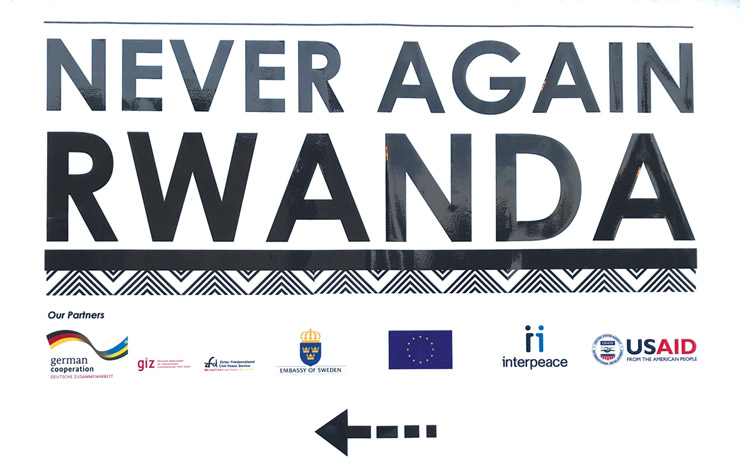
Many of the children in the school system were starving before coming to the schools, it stunted their growth, and continues to do so. “The government’s solution is to provide whole milk to growing students,” says Tanny.
They found it odd, sometimes, to reconcile extreme poverty in places to classrooms filled with laptop computers. “They lack power, and plumbing, but are learning on top of the line laptops.”
Agriculture is the main activity in the region Kellerts visited, where they discovered that the women of the cooperative are by no way unique. “Everyone carries their bundles on their heads. Men and women are riding bicycles on busy roadways alongside cars and trucks,” Ben says. “But there are no catcalls, just encouragement.
“Komera, they say to those carrying the loads.
“Be strong. Have courage. Komera.”
The couple got to take a day and visit a National park where an over-protective mother elephant made things more exciting than they’d planned on for a few minutes.
They say their trip was an experience they will not soon forget.
Originally published in the March 22, 2019 edition.
Never miss an issue – become a subscriber today! CLICK HERE!
Print is still the most effective medium. Attract LOCAL customers by supporting LOCAL media. ADVERTISE!
ads@thecommunitypress.com
Leslie Cholowsky
Editor



